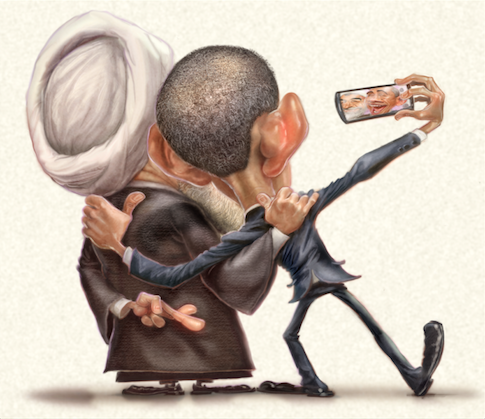What Went Wrong Between the U.S. and Israel — and How to Fix the Alliance
Brian Katulis and Michael Singh/Wall Street Journal
March 10, 2015
Repair efforts should focus on shaping a worthwhile Iran agreement, addressing the growing instability and terrorist threats on Israel’s borders, and rebuilding trust in the peace process. U.S.-Israel relations hit their lowest point in decades in the fracas that enveloped Israeli Prime Minister Benjamin Netanyahu’s address to Congress. Yet the foundation for bilateral ties is still stable. It includes a long list of shared security goals, continuous and deep engagement across government and society, and strong public support in both countries for working together. These features are in short supply among U.S. partners in the Middle East, and Israel needs all the help it can get — which is why U.S. and Israeli leaders should take steps to repair relations after Israel forms its new government, no matter who leads it.
The crisis in U.S.-Israeli relations is often attributed to an ideological or personal conflict between President Barack Obama and Mr. Netanyahu. But the roots of the crisis run deeper. The United States and Israel have struggled to adapt their national security strategies to a changed regional landscape. Strategic shocks to the Middle East in the past decade include the rise of Iran’s regional influence after the 2003 Iraq war; growing threats from Islamist terrorist groups such as Hamas, Hezbollah, and the Islamic State (ISIS or ISIL); and the 2011 uprisings that opened the door to a series of transitions in Egypt and Syria’s civil war.
Israel and the United States reacted to these shocks differently. President Obama prioritized diplomacy toward Iran and the Israeli-Palestinian conflict but otherwise sought distance from regional issues. Israel, having no option to withdraw, hunkered down. Mr. Netanyahu saw U.S. policy as imposing burdens on allies while relieving pressure on adversaries, and paving the way for a deeper disengagement that would leave Israel to fend for itself. Mr. Obama saw Israel as resisting U.S. ideas without offering viable alternatives.
Despite these dynamics, the cliche that the relationship is “indispensable” is true. Israel is a rare sort of ally in today’s Middle East: It not only shares U.S. interests but also is willing and able to advance them, easing our burden. For Israel, the U.S. alliance is a national security pillar, conveying strength and support to adversaries that might otherwise be tempted to try to take advantage of Israel’s small size and isolation.
This makes repairing the U.S.-Israel relationship a security priority as well as a political matter. Repair efforts should happen in a channel of empowered aides trusted by each side, much as French ambassador Jean-David Levitte and U.S. national security adviser Stephen Hadley were able to repair Franco-American relations in the wake of the Iraq war. Efforts should focus on three key fronts:
1. Iran. The White House must recognize that while Mr. Netanyahu may be the most vociferous critic of U.S. diplomacy with Iran, Israeli concerns are shared by other allies in the region — and this is not the only issue that divides us from allies. A nuclear deal is not assured, nor would one resolve our concerns about Iranian support for terrorism or other destabilizing activities. In addition to securing a worthwhile agreement, we need to reassure allies about continuing U.S. commitment to address these threats. Devising joint strategies for doing so and bolstering our allies’ capacity to contribute is a start. The United States has lacked a broader regional strategy for a long time and would benefit from one, regardless of the outcome with Iran.
2. Counterterrorism on Israel’s borders. The panoply of terrorist networks operating in Syria, Egypt’s Sinai Peninsula, southern Lebanon, and the Palestinian territories of the West Bank and Gaza pose a threat to Israel and to the U.S. Israel used to worry about Arab strength; now, it fears Arab disarray and weakness. We should not only confront these groups directly but also offer to mutual partners such as Jordan support in the form of military and intelligence cooperation as well as close and early consultation on a shared regional agenda.
3. The Israeli-Palestinian conflict. A steadier approach is needed. Washington’s ability to advance peace is a function of the extent to which it enjoys the trust of all sides — Israel, the Palestinians, and the Arab states — and influence in the region. That trust and influence have receded on every front as each party despairs of reaching a negotiated two-state solution. The U.S. must be willing to engage in the incremental, unglamorous work of restoring trust — among all sides — to halt the regression of the peace process and rebuild its foundation. For its part, Israel must recognize that bad ideas will continue to fill the diplomatic vacuum as long as it neglects to put forward a plan to resolve the conflict. Hanging over our agenda is doubt among U.S. allies about our commitment to the region, to our allies and their interests, and to action. The U.S.-Israel alliance is a leading indicator of this commitment and is of surpassing value to U.S. security. Repair efforts will require leaders in both countries to take constructive steps together.
**Brian Katulis is a senior fellow at the Center for American Progress. Michael Singh is the managing director and Lane-Swig Senior Fellow at The Washington Institute. This article originally appeared on the Wall Street Journal blog “Think Tank.”



















